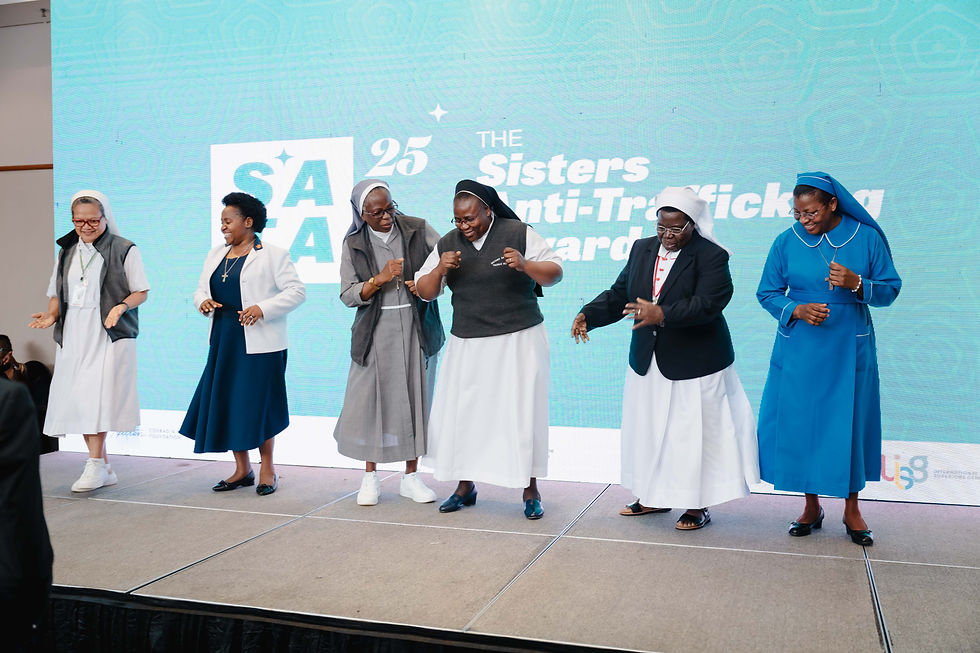Arise & Karen Bradley MP host Commons panel on Albania and human trafficking
- Arise

- Feb 9, 2023
- 4 min read
On the 7th of February, Arise hosted a discussion panel in the House of Commons, facilitated and hosted by our trustee, Karen Bradley MP. The session was entitled 'Albanian trafficking to the UK - causes, conflations and actual solutions'.
The panel featured Karen Bradley MP (Arise Trustee and Co-Chair of the APPG on Human Trafficking and Modern Slavery) Dame Sara Thornton (former Independent Anti-Slavery Commissioner), Anxhela Bruci (Arise Albania Coordinator), and Dr Andi Hoxhaj (author and Professor of Law at UCL).
The panel was organised by Arise as a response to changes to the UK's modern slavery laws. The UK Government claims that significant numbers of Albanians are arriving in Britain and falsely claiming to be victims of trafficking. This claim has been echoed across the media. In response, the Government has decreased protections for potential slavery victims. These legal changes reduce protections for legitimate victims, with minimal impact on small boat arrivals.
Arise has an office in Albania, which works to prevent human trafficking in high risk communities. With Albania being the largest source country of victims of human trafficking to the UK, the question of victim's treatment on being trafficked to the UK is a chief concern.
Discussion
Karen opened the discussion with a critique of the press's treatment of the UK's modern slavery framework in relation to recent Albanian arrivals and cases. She emphasised the difference between smuggling and trafficking, separated by the express presence of coercion and exploitation - a crucial distinction.
Dame Sara Thornton discussed the government's actions. She opened her address by remarking on the lack of evidence from the government that Albanians are abusing modern slavery protections. She noted that "false claims" from arriving persons is not even a concept, because potential slavery victims do not apply to the NRM (the National Referral Mechanism - the slavery victim framework), but are instead referred by first responders.
In addition, since the NRM process was introduced, conclusive grounds decisions (positive identification of slavery victims with conclusive evidence) have increased in proportion from 58% in 2016 to 91% in 2021. This suggests that referrals are becoming more accurate. Dame Sara also took issue with the argument linking increased numbers of slavery referrals to system abuse. She pointed out that she and others have been advocating for first responders (including police forces) to be more aware of slavery red flags, and that increased referral numbers reflect a greater awareness of the pervasiveness of modern slavery. She also pointed out that total referral numbers are a fraction of the estimates for total victim numbers, leaving more work to be done. She also noted the startling lack of compassion towards vulnerable young people from Albania, who are often framed as willing participants in their own abuse or trafficking.
Dr Hoxhaj discussed the root causes of Albanian migration and analysed the structural factors causing so many Albanians to leave. He highlighted the lack of faith in the justice system, and cited polling showing extremely low levels of trust in these institutions. He also called for universal due process in the UK's response to asylum-seekers, warning that a special focus on asylum claims from a certain national group will lead to discriminatory treatment.
Dr Hoxhaj refers here to recent changes to modern slavery laws, and the UK Government's
decision to allow the prosecution of potential victims of forced criminality.
Anxhela Bruci gave attendees a perspective from Tirana, where she coordinates Arise operations. She told the story of Albania as a country that has struggled with corruption since the end of the Communist isolationist era and the civil war. She described push factors driving young people away and increasing vulnerability - corruption, huge youth unemployment rates, organised crime, and pull factors - false claims about the UK lifestyle and fake offers of employment elsewhere. These factors lead many Albanians to be tricked into exploitation and trafficking.
Anxhela described solutions to these structural factors. She mentioned the funding of social enterprises to keep vulnerable youth in Albania, and UK Government investment in Albanian NGOs to stem the current flow. She highlighted the potential of private sector investment in Albanian industries - noting the largely untapped tourist industry.
Q & A
The question-and-answer session was lively, with a variety of questions from attendees. Dr Hoxhaj made an important point about the lack of Albanian Government support for survivor protection. As a result, fewer survivors get the necessary help when returning, fewer are encouraged to return, and those that do are more likely to return to criminal activity or networks.
There was an interesting discussion on solutions to the brain drain, with Dame Sara acknowledging the potential of skilled visa schemes for young Albanians to work elsewhere in Europe. Simultaneously, it was noted that such proposals would contribute to the current exodus, and that the priority must be the facilitation of promising opportunities for young Albanians locally.
The panel was well-attended, with attendees including representatives from across the anti-trafficking and victim support sector, along with parliamentarians, civil servants, lawyers and journalists. Karen concluded the panel by stressing that the onus is on all of us to continue campaigning to improve the lot of trafficking victims and young people across the nation.
Arise is looking forward to hosting similar events in the future.









Comments